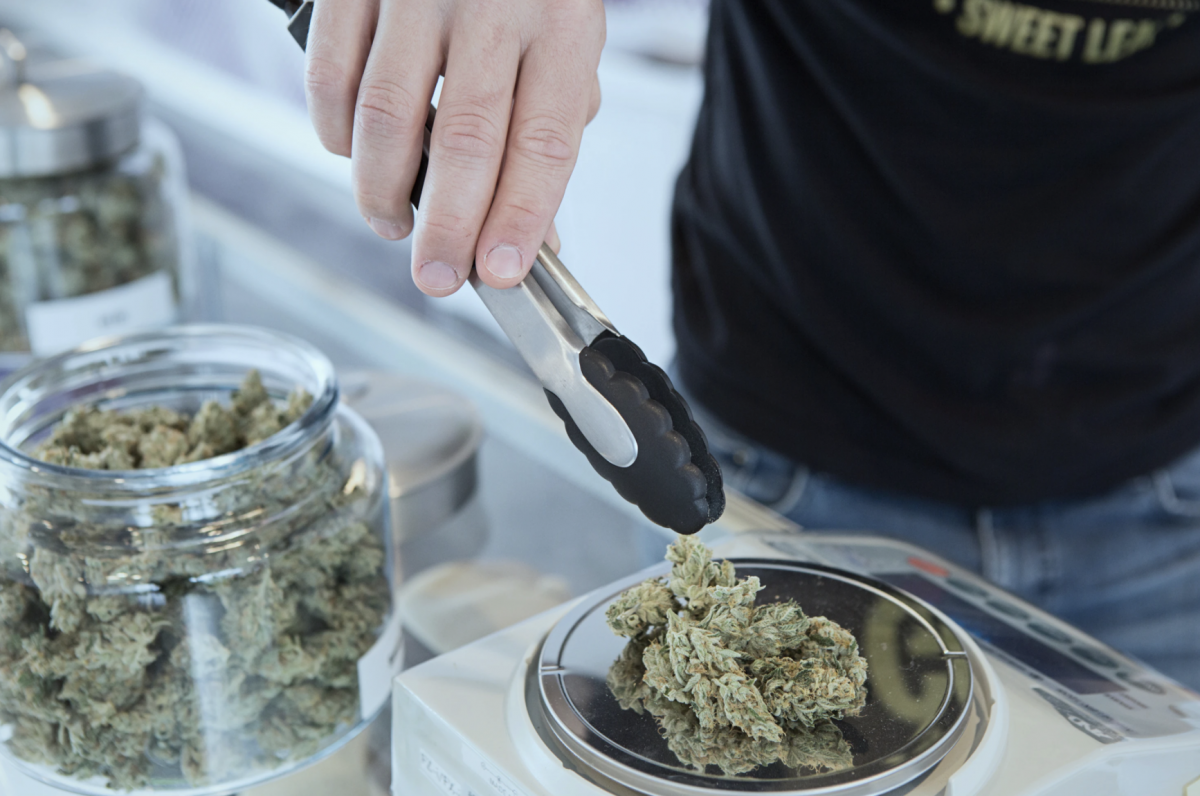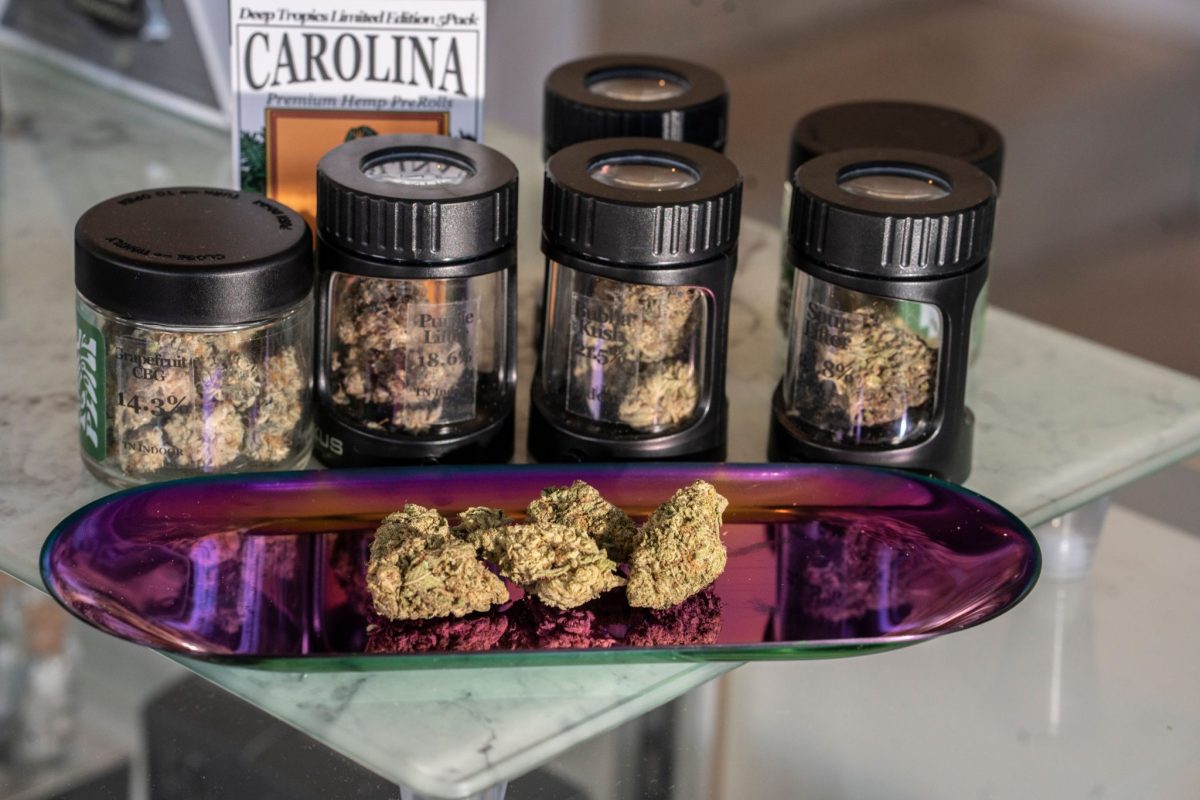In this week’s Memphis Flyer Podcast, Contemporary Media CEO Anna Traverse talks about AI in the newsroom, the challenges of keeping the press free, and our cover story on MPD traffic stops and marijuana.


In this week’s Memphis Flyer Podcast, Contemporary Media CEO Anna Traverse talks about AI in the newsroom, the challenges of keeping the press free, and our cover story on MPD traffic stops and marijuana.

Smokeable cannabis products, especially the THC they create when lit, took another — possibly lethal — blow Thursday as the Tennessee Senate followed the House in passing a law that bans products containing THCA.
House members passed an amendment last Thursday removing THCA from legal cannabis products in the state. THCA was already banned in the Senate version of the bill traveling through the committee process.
That bill passed Thursday after a lengthy floor debate ending in a vote of 23 to ban the substance and only nine against it. The only legislative glimmer of hope for cannabis companies across the state now is a veto from Tennessee Gov. Bill Lee.
Sen. Richard Briggs (R-Knoxville) sponsored the Senate bill. He argued the bill protects consumers, taxes cannabis products fairly, and does not harm Tennessee hemp farmers. He said much of the products on shelves here are grown out of state. But the bill was about a lot more than all of those, he said.
“We’re really gonna be voting here on whether to have recreational marijuana or not,” Briggs said, noting that many products on shelves here now will get consumers high. “If we vote no on this bill, we’ll have unregulated recreational marijuana.”
Briggs described an anything-goes market in Tennessee with a variety of products to smoke, vape, eat, and drink. Also, the product sold today, he said, is “not your grandfather’s marijuana” that “they confiscated at Woodstock.”
“The average strength of marijuana in 1995 was 4 percent,” he said, without confirming his source information. “You can walk 20 minutes down the street here and buy…gummy bears that are 10 times that.”
On Thursday, as he’s done for years when talking publicly about cannabis products, Briggs pronounced “gummy bears” as “goomy bears.”
Sen. Heidi Campbell (D-Nashville) agreed with many of Briggs’ points. But she said she could not vote for the bill out of fear that state-by-state regulation on cannabis products has increased “black market activity.”
“We all know that people are going to other states and getting the products and coming back,” Campbell said. “When we attempt to put regulations [on these products] we actually drive people to other markets and drive a market here that is less predictable and less controllable…because people are going to be selling tickets on the black market.”
Sen. Kerry Roberts (R-Springfield) pushed back on the bill because he said it would make it illegal to manufacture, cultivate, produce, and sell these products. But Tennessee criminal law now does not make it illegal to possess these products, he said.
“I could drive to Kentucky,” Roberts said. “I could drive to North Carolina. I could drive to all these surrounding states and I could load up my car with as much as I want, and I can bring it home. I can do what I want to do with it all day long. I’m not going to be prosecuted by any (District Attorney) in Tennessee for violating law because I will not have violated a law.”
Sen. Page Walley (R-Savannah) said he’d recently watched the Bob Dylan biopic A Complete Unknown. Dylan’s song, “The Times They Are A-Changin'” was an anthem for those in the Civil Rights Movements, Walley said. He said “times are changing right now.”
He explained that most were comfortable with most of the bill, but uncomfortable with 5 percent-10 percent. Though he never spoke in specifics, Walley seemed uncomfortable with the THCA provisions.
“We’ve really decided to change the rules and move the goalposts in this conversation after the game is in progress,” Walley said. “We told our farmers, we told our retailers, we told small business people who are honest, that are paying rents on facilities, that these were the rules.”
Sen. Jeff Yarbro (D-Nashville) agreed, saying “we’re pulling the rug out from under” Tennessee’s cannabis businesses. He the state is moving in a “prohibitionist direction” on cannabis issues while others move forward.
“We are too much, in this instance, like The Simpsons‘ character yelling at the clouds,” Yarbro said. “This is time for us to get serious, to get real, and actually help Tennessee consumers, to actually help Tennessee farmers, to actually help Tennessee businesses. And I don’t think this bill is the right way.”
The bill will become law upon Gov. Lee’s signature. Barring that, THCA protections are under review now in a lawsuit from the Tennessee Growers Coalition. That suit is to be heard this summer in Nashville.

Playin’
Entrepreneur and community organizer Keedran Franklin was straight up playing on Facebook last week. Over several Facebook posts, he pumped up what would be a huge announcement. Announcement time came, and his sound cut out. It left many laughing and many more like this from Arlen Dewayne Berry.

Franklin had still not revealed his big announcement as of press time.
A Cannabis Request
“Can y’all not smoke a crap load of weed and then hang out at the zoo around kids?” asked u/criticalmonsterparty over in the Memphis subreddit. “I’m not hating on anyone’s personal preferences, but there was two distinct smells at the zoo today — animal poop and weed.”
Seeing Double

The subreddit was also enamored with a glorious double rainbow that appeared over the city last week.
Trophies

“Trophies.” That was the whole Tweet.

Lawmakers gonna law-make, and committee agendas for the Tennessee General Assembly are filled to the brim with a vast and complex array of proposals for a better Tennessee (depending on where you sit).
Hundreds of bills filed in Nashville cover everything from far-right-fueled covenant marriages to hunters finding wounded deer with drones to rules that take the high out of Tennessee cannabis products — and so much more.
Here are a few bills we’re watching.

Gender transition (SB 0676)
Senator Brent Taylor (R-Memphis) says this law ensures that if a gender clinic takes state funds to perform gender transition procedures, they’ll have to also perform “detransition procedures.”
The bill also requires a report to the state on a ton of information about any transition procedures: the age and sex of the patient, what drugs were given to them, when the referral was made, what state and county the patient is from, and a complete list of “neurological, behavioral, or mental health conditions” the patient might have had. Almost everything but the patient’s name and WhatsApp handle.
Forever chemicals (SB 0880)
The U.S. Chamber of Commerce is pushing this bill, and maybe not just in Tennessee.
When Mark Behrens, a representative of the U.S. Chamber of Commerce Institute for Legal Reform, explained it to a Senate committee last week, he specifically mentioned PFAS (also called forever chemicals by some), which are found in nonstick cookware, firefighting foam, and more. He also broadly mentioned “microplastics” and “solvents.”
Behrens claimed these may have a PR problem but they may also be in a situation where “the science [on them] is evolving and they may not have an impact on human health, or that impact may be unclear.”
So rather than the state banning them for just having a bad rap, any ban would have to be based on “the best available science.”
Senator Janice Bowling (R-Tullahoma) asked if this could be used to keep fluoride out of drinking water. No, she was told.
Medical Ethics Defense Act (SB 0955)
“This bill prohibits a healthcare provider from being required to participate in or pay for a healthcare procedure, treatment, or service that violates the conscience of the healthcare provider.” The bill itself is scanty on details. On its face, it sure sounds like it’s aimed at the LGBTQ community.
But bill sponsor Senator Ferrell Haile (R-Gallatin) said it was a “straightforward bill,” covering things such as assisted suicide or whether or not a pharmacist felt comfortable prescribing birth control.
Deer and drones (SB 0130)
This one is straightforward. It would allow hunters to use drones to find deer they shot.
WHO now? (SB 0669)
With this bill, Taylor, the Memphis Republican, says pandemics can only be declared by the American, baseball-and-apple-pie Centers for Disease Control and Prevention (CDC), not the Swiss, soccer-and-Toblerone World Health Organization (WHO).

Cash for STI tests (SB 0189)
Senator London Lamar (D-Memphis) wants to give higher-education students in Tennessee $250 for taking a voluntary test for sexually transmitted diseases.
Felonies for protestors (SB 0672)
You know how Memphis protestors like to shut down the Hernando DeSoto Bridge? Well, Taylor, that Memphis Republican, would make that a felony.
But it’s not just big roads and protestors. The bill applies to anyone obstructing “a highway, street, sidewalk, railway, waterway, elevator, aisle, hallway, or other place used for the passage of persons or vehicles.” Those would be Class E felonies.
But if the “offense was committed by intentionally obstructing a highway, street, or other place used for the passage of vehicles,” it would be a Class D felony.
What’s in a name? (SB 0214)
This bill would prohibit any public facility to be named for a local public official who is currently in office — and for two years after they leave office. The same prohibition would also apply to anyone who has “been convicted of a felony or a crime of moral turpitude.”
Covenant marriage (SB 0737)
This bill creates “covenant marriage” in Tennessee. And the most important thing the bill caption wants you to know about the law is that this kind of marriage “is entered into by one male and one female.”
Covenant marriage is, like, a mega, pinky-swear marriage. To get it, couples have to go to premarital counseling and their preacher or counselor or whoever has to get notarized and some kind of pamphlet to be printed by the secretary of state.
Getting out of a covenant marriage is, like, way hard. A partner would have to cheat or die, be sentenced to death or lifelong imprisonment, leave the house for a year, or physically or sexually abuse the other partner or the couple’s children.
These types of marriages are only available now in Arizona, Arkansas, and Louisiana.
Oh, and if you wonder where this is coming from, check out a video posted on our website that shows Senator Mark Pody (R-Lebanon), one of the bill’s sponsors, at church talking about “wicked” gay marriage. — Toby Sells

Clearing Homeless Camps (SB 0217)
A bill would give those living in homeless camps three days to vacate if their camp is targeted for removal in a new program that could cost around $64 million each year from the state highway fund.
Senate Bill 0217 would require the Tennessee Department of Transportation (TDOT) and other agencies to regulate “the collection, storage, claiming, and disposal of personal property used for camping from the shoulder, berm, or right-of-way of a state or interstate highway, or under a bridge or overpass, or within an underpass of a state or interstate highway.”
The bill, sponsored by Taylor, coasted through its first vote by the Senate Transportation and Safety Committee last week with only one Democrat voting against it. Taylor said he had experience in trying to clear areas of personal property and called it the “most complicated thing [he] had done as an adult.”
“What this bill does is simply allow TDOT to go into communities like Memphis, Nashville, Chattanooga, Knoxville, or any other community and to go ahead and preplan how they’re going to deal with homeless encampments and go ahead and work with social services networks in that community,” Taylor said.
Taylor said this network will include law enforcement, so that all the duties will already be spelled out when an encampment needs to be removed. He also said this bill does not criminalize homeless people.
“This serves not only the state and the local community, but this serves the homeless folks as well,” Taylor said. “When they identify a homeless encampment that needs to be cleared, there’ll be nonprofits and social services available to the people in homeless encampments. We all have empathy, but whatever has driven somebody to have to live under a bridge, their lot in life is not getting better by living under a bridge.”
Taylor said the bill will help communities develop a memorandum of understanding (MOU) to tackle this issue in a way that’s beneficial to both the city and the homeless. Senator Heidi Campbell (D-Nashville) asked if the bill outlines how their belongings will be stored, to which Taylor responded that the decision would be left to the board.
“I understand the intent,” Campbell said. “I have a similar thing happen in my district. I just am concerned without the direction from the legislation, the homeless peoples’ items and things need to be considered, that we’re putting the discretion to be able to take stuff away from homeless people in somebody’s hands where it might not have been before.”
Lindsey Krinks, co-founder of Housing for All Tennessee and Open Table Nashville, noted citizens’ concerns for the bill — specifically, the disposal of homeless people’s belongings.
“What this bill doesn’t tell you is that the campsite removal costs will be passed down to local governments; we’re really concerned about that,” Krinks said. “We all want to see the number of people living in encampments decrease, but the way we do that is not to play a game of Whack-A-Mole. It’s to break the cycle of homelessness through providing housing and support to people.”
Krinks said the bill does not address homelessness nor the deficit of housing or shelter. She noted that the bill’s “aggressive” deadline of removal three days after receiving a complaint does not allow people to secure permanent housing.
Taylor said this bill will address these concerns as the agencies and TDOT will help people get connected to the services they need. He said continuing to let people live in encampments without services does not provide them with extra support.
“If you support homeless people and want to get them the services they need and help them live in dignity, then you would support this bill because we’re able to make that connection when we clear a homeless encampment between a person in need and social services they need to connect them,” Taylor said. — Kailynn Johnson
Happy high? (HB 1376)
State Republicans propose either stricter cannabis rules or none at all.
Despite warnings that the hemp industry would be decimated, the House Judiciary Committee passed a measure last week that would put stricter regulations in place.
Sponsored by House Majority Leader William Lamberth (R-Portland), House Bill 1376 would place the industry under the Alcoholic Beverage Commission instead of the Department of Agriculture and remove products from convenience and grocery stores. Only vape and liquor stores would be allowed to sell some hemp products.
The House bill was slated to be heard this week in the Commerce Committee where agreements with the industry could be reached.
“It does ban [derivatives] THCA and THCP. The reason for that is we have not legalized marijuana in this state,” Lamberth said.
Hemp is distinguished from marijuana in that it contains a compound called delta-9 THC. Cannabis with a concentration of less than 0.3 percent delta-9 THC is defined as legal hemp in Tennessee — and federally. Cannabis with concentrations greater than 0.3 percent is classified as marijuana and is illegal to grow, sell, or possess in Tennessee.
Hemp flowers also contain THCA, a nonintoxicating acid that would be banned in Tennessee under this bill. When heated or smoked, the THCA in the plant converts into delta-9 THC — an illegal substance in Tennessee in greater than trace amounts.
Clint Palmer, a representative of the hemp industry, told lawmakers the bill is similar to one passed in 2023 that led to a lawsuit against the Department of Agriculture that remains in litigation.
If the new measure passes, Palmer said, hemp businesses will be forced to shut down, even after spending millions of dollars complying with state regulations.
“Bill sponsors have said it’s the Wild West in regards to the current hemp program. This is far from the truth,” Palmer said.
The 2023 law put new restrictions on products containing THC, he said, and noted retail stores, manufacturers, and distributors are required to be licensed or face criminal charges. Palmer added that regulation is lacking from the Department of Agriculture, despite a 6 percent tax on hemp-derived products, half of which nets the department $1 million a month.
Lamberth has said that consumers should know the ingredients when they buy a hemp product. But Palmer said those are listed on labels, based on the 2023 law.
The House leader also indicated that the industry appears ready to sue the state again because the federal Farm Act sets standards on hemp. Palmer didn’t acknowledge whether a lawsuit could follow the new bill’s passage, but he said the Alcoholic Beverage Commission doesn’t “have a clear understanding of the hemp plant, and it’s clearly shown in this bill.”
The Senate version of the bill, sponsored by Senator Richard Briggs (R-Knoxville), is to be heard next by the finance committee. Briggs said last week as soon as the products are heated, they become marijuana.
“We could withdraw the bill and let’s just put another bill out there that says we’re going to have recreational marijuana,” Briggs said. “Let’s be perfectly honest. It’ll help the businesses, we’ll have great revenue, and everybody smoking the stuff will be a lot happier.” — Sam Stockard, Tennessee Lookout
Healthcare on the Hill (SB 0402 / SB 0403 / SB 0575)
Senate Democratic Caucus Chairwoman Senator London Lamar (D-Memphis) introduced SB 0403 and SB 0402 to tackle the issue of medical debt. SB 0403 proposes that hospitals match the amount of money they receive from the government to cover “uncompensated care” in erasing medical debt. According to the Tennessee General Assembly, taxpayers paid $153 million to cover payments for 107 hospitals.
“If a hospital takes public money, they should lift patient debt in return,” Lamar said. “Healthcare should heal, not bankrupt. This is about real relief for working people — helping families stay in their homes, invest in their futures, and live with dignity.”
SB 0402 seeks to further alleviate the toll of medical debt as it would remove its inclusion from credit reports. Lamar called medical debt an “unfair financial harm.”
Lamar has also long been an advocate for reducing the state’s maternal health crisis. The state has historically had the worst maternal mortality rate in the country. To aid in this, Lamar filed SB 0575, which would require new mothers to receive information about postpartum warning signs from hospitals.
“There’s an education gap women are experiencing as far as resources, what to do, and how to go through this process,” Lamar said. “In an effort to ensure that women have the best pregnancy outcome possible, we want to make sure we’re providing them with more tools in their toolbox to protect themselves and their child in this process and after.”
Lamar said this bill would add an extra layer of accountability to make sure hospitals and birthing centers are doing their part to educate women. The senator said that medical deserts create a significant gap in accessing quality care even before they seek pregnancy care. She went on to say pregnancy outcomes are reliant on the mother’s lifestyle before and after the process.
“We have an unhealthy community that is deprived of access to resources and doctors,” Lamar said. “There is a financial burden of not being able to afford the healthcare they need. Healthcare is really expensive. It’s very elitist. It’s the haves and the have-nots, so if you don’t have the money to have insurance or pay out of pocket, then you don’t get healthcare. That stems down to Black women who are less likely to have the care they need, rural women in rural areas who are experiencing poverty don’t have access [to care.]”
The idea of providing equitable healthcare and rights have extended to reproductive bills such as HB 0027 sponsored by Representative Aftyn Behn (D-Nashville). The bill, which has been supported by groups such as Tennessee Advocates for Planned Parenthood, states that everyone has a “fundamental right to make decisions about their reproductive health care.” HB 1220 also protects reproductive freedom as it safeguards the right to choose whether or not a person wants to use contraceptives.
Some GOP bills, like the Medical Ethics Defense Act mentioned above, seek to curb access to care. Meanwhile, SB 0139, sponsored by Senator Adam Lowe (R-Calhoun), would mandate hospitals accepting Medicaid to collect and report citizenship status about patients, and report these demographics to the Tennessee Department of Health. The department would then submit this information to state government officials to track the impact of “uncompensated care for persons not lawfully present in the United States and other related information.” — KJ

Republican lawmakers are coming for your cannabis products, again.
Two new bills filed for the upcoming session of the Tennessee General Assembly outright ban the sale of THCA products. One of those would remove all cannabis products from gas stations (or any store that allows those under 21) and more. However, another bill, also filed by Republicans, would outright legalize all “smoking hemp.”
The Tennessee Growers Coalition, an industry advocacy group, raised the alarm on the bills. They say the bill put “a direct target on the industry.”
“There are several bills that have been introduced this week that will directly affect the industry, and not in a good way,” reads a newsletter the group sent Friday.
A bill sponsored by state Sen. Ferrell Haile (R-Gallatin) and state Rep. Ed Butler (R-Rickman), says hemp is legal only as long as it contains the state-limited .3 percent total THC. However, it further specifies that legal hemp here would still need to meet that amount after it is heated (y’know, smoked). Further, the bill outlaws all THCP and THCA products.
Another bill, filed my House Majority Leader Rep. William Lamberth (R-Portland) and Sen. Richard Briggs (R-Knoxville) includes the THCA ban but also completely reorganizes how hemp products are sold in Tennessee. Lamberth has worked on cannabis issues for years now and is largely responsible for the market as it is now.
That market is overseen by the Tennessee Department of Agriculture. However, the new bill would move that oversight to the Tennessee Alcoholic Beverage Commission.
The new bill would remove all hemp-derived cannabis products from any store that allows customers under age 21. In those stores, hemp products must be kept behind counters or some other place “that requires assistance from a retail clerk in order to access and purchase” the products. Liquor stores, however, could keep hemp beverages (12 ounces or greater) in coolers for customers to access themselves.
Hemp products could be sold in vending machines, self-checkout systems, or online. Giving samples would be illegal.
Products can only contain a maximum of 250 milligrams of hemp in 10 equal servings. Those products would come with a list of possible allergens, ingredients, and total hemp volume. They’d also come with a “conspicuous warning statement having a minimum font size of 11-point font concerning the risk of impairment from consumption of the product, keeping the product out of the reach of children, and other warning information.”
Advertising for hemp products cannot feature “superheroes, comic book characters, video game characters, television show characters, movie characters, or unicorns or other mythical creatures.” Sorry, Bigfoot.
Hemp products could not be mixed with alcoholic beverages or used as an ingredient in beer. Retailers cannot make claims “pertaining to diagnoses, cures, or mitigation or treatment of any human disease or other condition.”
Another bill, filed by Rep. Chris Hurt (R-Halls) and Sen. Page Walley (R-Savannah) simply (but officially) adds “smoking hemp,” meaning dried cannabis flower, to state law.

Cannabis would be legal for recreational and medical uses in Tennessee next year if the Tennessee General Assembly passes either of two similar bills filed by Democrats this week.
One bill is called the Tennessee Cannabis Act. The other is called the Pot for Potholes Act.
The first is from state Rep. Larry Miller (D-Memphis) and state Sen. Jeff Yarbro (D-Nashville). The second is from state Rep. Aftyn Behn (D-Nashville) and state Sen. Heidi Campbell (D-Nashville).
Both bills allow all Tennessee adults over 21 to possess, use, and transport small amounts of cannabis for personal use. Both would allow cannabis retailers to sell all THC products. They would also allow Tennesseans to grow up to 12 cannabis plants for personal use.
Both bills would tax cannabis sales at 15 percent on the state level and allow local governments to add a 5 percent tax to local sales of cannabis. State budget experts have not yet estimated how much revenue those tax figures might bring.
A bill filed last year would have established a medical marijuana program in the state. Tennesseans would have been only eligible to buy cannabis products if they had a diagnosis from a specific list of medical conditions. That law would have made the total state marijuana tax 10 percent and a local tax up to 3 percent. State budget experts predicted that plan would have yielded tax revenues of more than $48 million annually.
The new cannabis plans differ in how revenues are spent. The broader Tennessee Cannabis Act specifies only that about 15 percent of the money go to state agencies to run the cannabis program. The rest would go into he state’s general fund and spent at the discretion of lawmakers.
The Pot for Potholes fund earmarks 75 percent of all cannabis tax revenues for the state highway fund. Most of the rest of the money would go to Tennessee’s 95 counties. A remaining 5 percent of the funds would go to state agencies to manage the program.
The bills seem the same in almost every other way. Both would:
• Regulate cannabis packaging. Products for sale would have to be sold in child-resistant packaging, carry a new, universal cannabis symbol, and show the total amount of THC in the product.
• Cap personal possession at 60 grams of marijuana, but not more than 15 grams of concentrate
• Allow private cultivation of 12 plants in a private area that is locked and not visible from a public place.
• Allow a parent or guardian to give cannabis products to their children for a medical condition, excluding smokeable products.
• Allow for the commercial grow and sale of the product.
• Allow for the possession of marijuana-related paraphernalia such as water pipes, etc. (with exceptions)
• Allow employers to prohibit the use of cannabis products in the workplace.
• Allow employers to discipline workers for cannabis use.
• Allow employers to consider cannabis use in its hiring process (with certain restrictions).
• Allow personal cannabis users and growers to buy firearms.
• Cannabis possession or use would not be grounds to deny a lease to a potential residential tenant.
• Cannabis use would not be allowed in a motor vehicle, a watercraft on public waters, or in a public place.

The sale of popular hemp products will remain legal in Tennessee until at least June, when a legal challenge to state rules that would outlaw many best-selling products goes to trial in Nashville.
The decision represents a six-month reprieve for Tennessee’s burgeoning hemp industry, which has grown to an estimated $280 million to $560 million in annual sales since the products were legalized nearly six years ago, according to industry survey data.
In dispute are rules, formulated by the Tennessee Department of Agriculture, to require new testing of hemp products for so-called delta-9 THC.
Two industry groups, the Tennessee Growers Coalition and the Tennessee Healthy Alternatives Association, argued the rules, set to go into effect Dec. 26, represented agency overreach and would lead to the ban of products that have not been outlawed by the Tennessee General Assembly.
Tennessee hemp industry makes last-minute legal bid to halt rules banning popular products
State attorneys argued the agriculture agency is well within its rights to set certain limits on chemicals found in hemp.
Days before the rules were set to take effect, Davidson County Chancellor I’Ashea Myles issued a temporary injunction until Feb. 18. That injunction will now remain in effect until trial, scheduled for June 5.
Hemp is a cannabis plant that has been legally available in Tennessee since the Legislature first approved its production, possession and sale in 2019.
It’s distinguished from marijuana by its concentration of a compound known as delta-9 THC. Cannabis with a concentration of less than 0.3 percent delta-9 THC is defined as legal hemp in Tennessee — and federally. Cannabis with concentrations greater than .3 percent is classified as marijuana and is illegal to grow, sell or possess in Tennessee.
Hemp flowers also contain THCA, a nonintoxicating acid that has not been outlawed in Tennessee. When heated or smoked, however, the THCA in the plant converts into delta-9 THC — an illegal substance in Tennessee when it is present in greater than trace amounts. The new rules would require testing for the delta-9 THC produced when THCA is heated.
Tennessee Lookout is part of States Newsroom, a nonprofit news network supported by grants and a coalition of donors as a 501c(3) public charity. Tennessee Lookout maintains editorial independence. Contact Editor Holly McCall for questions: info@tennesseelookout.com.

JANUARY
• A state report found “out of control” inmates, drug overdoses, staff shortages, and more in Tennessee state prisons, especially at Tiptonville’s Northwest Correctional Facility.
• Cannabis industry leaders began working against new state rules that would remove smokeable products from their shelves and damage the industry.
• Memphis Police Chief C.J. Davis kept her job but on an interim basis.
• SmokeSlam BBQ Festival was introduced.
• We got to the bottom of the “Dicc Dash” car that had been seen all over Memphis.
• Winter Storm Heather left five dead in Shelby County, pushed a record-breaking demand for electricity, and put all residents under a boil-water advisory.
FEBRUARY
• Artis Whitehead was exonerated 21 years after he was convicted of a 2002 robbery at B.B. King’s Blues Club.
• Governor Bill Lee pushed for more school vouchers and big business tax cuts in his State of the State address.
• The Memphis-Shelby County Schools board picked Marie Feagins as its new superintendent.
• Data showed that Black residents got four times as many traffic tickets than whites.
• A bill was filed to mandate gun safety training for every Tennessee school student.

MARCH
• American Queen Voyages closed.
• Eighteen anti-LGBTQ bills were introduced from GOP lawmakers in the state legislature.
• State House members voted to stop the Memphis City Council from a proposed ban on pretextual traffic stops, which came in the wake of the beating death of Tyre Nichols by MPD officers.
• The Overton Park Conservancy (OPC) gave an early look at new trails on land ceded to the park by the Memphis Zoo.
• Protestors cut short Kyle Rittenhouse’s appearance at University of Memphis.
• The Satanic Temple sued the Shelby County Board of Education over discriminatory practices on club meetings.
• A GOP House member wanted to ban lab-grown meat.
APRIL
• State GOP lawmakers wanted users to submit their ID before watching porn online.
• Bartlett’s American Paper Optics produced nearly 3 billion pairs of paper glasses for the solar eclipse.
• A shoot-out left MPD Officer Joseph McKinney and one suspect dead. McKinney was killed by friendly fire.
• State leaders introduced a $787.5 million project to replace the Memphis-Arkansas Bridge.
• State GOP lawmakers stopped Memphis leaders from studying Black reparations.
MAY
• The school voucher bill died.
• A Buc-ee’s was promised for Fayette County.
• Lee signed a bill that granted anti-LGBTQ parents the right to adopt LGBTQ children.
• The Biden administration paused a ban on menthol cigarettes.
• We caught up with Renee Parker Sekander, the city’s first LGBTQ liaison.
• Tennessee Attorney General Jonathan Skrmetti sued the federal government over rules on pronoun respect in the workplace.
• The zoo announced a 20-year, $250-million campus plan.
• Memphis Shelby County-Schools ruled against teachers carrying guns, despite a new state law allowing it.
• A mysterious investment firm claimed it owned Graceland and would auction it off.
JUNE
• Mr. Lincoln’s Costume Shoppe closed.
• Memphis ranked as most dangerous city for pedestrian deaths.
• Renting a home in Memphis became more affordable than buying one.
• Elon Musk announced Memphis would be the new home for his supercomputer, Grok.
• New census data said nearly half of Tennesseans could not afford the basic cost of living in their counties.
• Tina Sullivan announced she would step down from the OPC.
• The Memphis Area Transit Authority (MATA) asked the city council for $30.5 million after revealing a $60 million deficit.
• A federal judge blocked some protections of transgender people in Tennessee allowed by new Title IX rules.
JULY
• Planned Parenthood of Tennessee and North Mississippi said more than 10,000 people had left Tennessee for an abortion in the two years after Roe v. Wade was overturned.
• The U.S. Supreme Court announced it would hear Tennessee’s ban on gender-affirming care for transgender minors.
• The Memphis Brooks Museum of Art’s new Memphis Art Museum project was allowed to move ahead after a judge denied a challenge from Friends for Our Riverfront.
• City council members asked for more transparency from MATA after the announcement of its big budget deficit.
• New state laws went into effect including a death sentence for child rapists, one against “abortion trafficking,” a declaration of the Bible as a state book, one against “chemtrails,” and another for singers’ protection from AI.
• A court denied former state Senator Brian Kelsey’s (R-Germantown) request to rescind his guilty plea for campaign finance violations.
• The former leader of Shelby County’s Covid vaccine rollout lost a bid to declare she was wrongly blamed for allowing hundreds of doses to expire.
• A court ruled transgender Tennesseans cannot change the gender marker on their birth certificates.
• Memphis International Airport was green-lit for a $653 million modernization of its main terminal.
• The school board settled with the Satan Club for $15,000 and a promise to end its discriminatory practices.
• A court ruling allowed a ban on drag shows in public places.
• Tennessee tourism hit a record spend of more than $30 billion in 2023.
AUGUST
• Environmental groups asked Memphis Light, Gas & Water (MLGW) to deny an electricity deal for xAI’s supercomputer.
• The Links at Audubon Park opened.
• Memphis cases of HIV and syphilis spiked 100 percent over the past five years.
• Leaders warned of a tax surge coming after property reappraisals next year.
• Black Lodge closed.
• Serial scammer Lisa Jeanine Findley was arrested in Missouri for her attempt to steal Graceland from the Presley family.
• MATA suspended trolley service.
• Kaci Murley was named OPC’s new executive director.
• The Tennessee Valley Authority (TVA) raised electricity rates by 5.25 percent.
SEPTEMBER
• Carol Coletta stepped down as CEO of the Memphis River Parks Partnership.
• A state land deal could protect the Memphis Sand Aquifer.
• Cannabis industry leaders sued the state over new rules that would ban smokeable products.
• Tennessee ranked near the top for arresting people for cannabis.
• For the third year in a row, water levels were down in the Mississippi River after Midwest droughts.
• AG Skrmetti proposed warning labels for social media.
• Social media threats made for a turbulent week at local schools with disruptions and some lockdowns.
OCTOBER
• Lawmakers want to replace the now-fallen statue of racist newspaper editor Edward Carmack at the State Capitol Building with David Crockett.
• A court decision mandated schools offer “reasonable accommodation” for transgender students to use bathrooms of their choice.
• Three MPD officers were convicted in the beating death of Nichols.
• Memphis Mayor Paul Young replaced every member of MATA’s board.
• State Democrats pressed for financial reforms to address the state’s “crumbling transportation infrastructure.”
• Judges blocked discipline for doctors who provide emergency abortions.
NOVEMBER
• Atomic Rose closed.
• A new school voucher bill was filed.
• The Memphis-area crime rate fell.
• Tuition at state schools looked likely to rise again next year.
• TVA approved xAI’s request for power.
• Teachers scoffed at Lee’s $2,000 bonus as a “bribe” to go along with school vouchers.
• 901 FC left Memphis for Santa Barbara.
• University of Tennessee Health Science Center began a plan to demolish the “eyesore” former hotel building on Madison.
• Gun Owners of America sued the city of Memphis to block the gun referenda approved by voters from ever becoming law.
• A new $13 million plan will help redesign the intersection of Lamar, Kimball, and Pendleton.
• Crime fell Downtown in 2024 compared to 2023.
• Cannabis industry leaders filed another suit against the smokeables ban after lawmakers left it in the final rules.
DECEMBER
• Buds and Brews, a restaurant featuring cannabis products, opened on Broad.
• Blended sentence laws could usher hundreds of kids into the adult criminal justice system.
• State revenue projections flagged on big business tax breaks.
• A blistering report from the U.S. Department of Justice found that MPD used excessive force, discriminated against Black people, and used “harsh tactics” against children.
• Houston’s abruptly closed.
• The SCOTUS heard Skrmetti’s case against gender-affirming care for transgender minors.
• The former Velsicol facility in North Memphis could enter into a state-run environmental response trust.
• Feagins narrowly survived the board’s ouster move but the situation will be reviewed in 2025.

Tennessee legislators remain out of step with state voters over gun safety, the legalization of marijuana, and women’s reproductive healthcare, yet enjoy a bump in approval, according to the results of a recent Vanderbilt Poll.
The poll surveyed 955 registered voters statewide from Nov. 18 to Dec. 4.
The survey found an approximate six to seven percent boost for state lawmakers: 53 percent of respondents approved of the job state lawmakers are doing, a seven percent increase from the May poll, while Gov. Bill Lee’s approval rating similarly moved from 54 percent to 60 percent. U.S. Sen. Marsha Blackburn, who was overwhelmingly reelected in November for a second term, found her approval rating jump from 46 percent to 53 percent and Sen. Bill Hagerty’s rose to 46 percent from 40 percent.
Vanderbilt Poll co-director Josh Clinton, a political science professor, said the increased ratings were likely “an afterglow of the election.”
Yet across party lines, voters expressed support for the legalization of recreational marijuana, with 53 percent Republicans supporting such a move and 78 percent of Democrats. This comes as Tennessee’s Department of Agriculture is moving to ban the sale of recreational hemp products that are in the same family as marijuana but have been legal since 2019.
Four gun reform measures were tested, each of which polled strongly despite partisan affiliation. A whopping 86 percent of respondents said they support laws that would require gun owners to report if their weapons were stolen are missing — including 74 percent who identified as supporters of President-elect Donald Trump.
When asked about passage of a so-called red flag law, which would temporarily restrict gun access for those deemed to be at risk of harming themselves or others, 78 percent indicated they are in favor.
Tennessee hemp industry makes last-minute legal bid to halt rules banning popular products
Support for healthcare also garnered bipartisan support, with 73 percent supporting the expansion of Medicaid in Tennessee, a measure state lawmakers have consistently resisted since 2012.
According to the Tennessee Justice Center, Tennessee loses about $1.4 billion in federal funds annually by declining to expand the program, which provides coverage to children, pregnant women, the elderly, and people with disabilities.
Tennessee has a near total abortion ban but the percentage of Tennesseans who say they support women’s right to obtain the procedure has climbed from 37 percent in 2012 — the first time the Vanderbilt Poll measured on the question — to 53 percent in the recent survey.
“While much ink has been spilled about what the election results mean about the electorate, these results suggest little change in the opinions of Tennesseans, which means the misalignment between voters and elected officials continues,” said John Geer, co-director of the Vanderbilt Poll, senior advisor to Chancellor Daniel Diermeier, professor of political science and holder of a Gertrude Conaway Vanderbilt Chair.
In other findings:
• Tennesseans are almost equally split on the question of whether the state is on the right track or wrong track, with 50 percent agreeing with the former and 46 percent with the latter.
• There has been almost no change in the percentage of poll respondents who describe themselves as conservative or very conservative, rising from 47 percent in 2015 to 48 percent almost a decade later.
• Deportation of immigrants, particularly those with criminal records, is popular. Across all demographics and party affiliation, 84 percent of those polled support the deportation of undocumented immigrants who have committed crimes.
The full poll can be accessed here.
Tennessee Lookout is part of States Newsroom, a nonprofit news network supported by grants and a coalition of donors as a 501c(3) public charity. Tennessee Lookout maintains editorial independence. Contact Editor Holly McCall for questions: info@tennesseelookout.com.

Tennessee’s hemp industry is making a last-ditch legal effort to halt sweeping new rules that would ban the sale of popular hemp products legally available in the state since 2019.
Attorneys representing Tennessee hemp retailers and producer associations are expected in a Nashville court Monday just ahead of new state product testing rules scheduled to take effect Dec. 26.
The rules would bar the manufacture, distribution and sale of many of the best-selling hemp products that have helped drive a nascent state industry to generate $280-$560 million in sales annually, based on survey data cited in legal documents.
The hemp products haven’t been outlawed by the Tennessee legislature or the federal government.
TN Agriculture officials want to curb CBD and THCA smokables, offer cryptic response to questions
Rather, new legislation designed to impose first-time regulations on Tennessee’s five-year-old hemp industry –—such as license requirements, taxes, and age restrictions — have been interpreted by the Tennessee Department of Agriculture in a way that would render certain hemp products illegal.
The rules require products to be tested for the first time for so-called TCHA content, a naturally occurring and still-legal substance found in all hemp plants. When hemp flowers are heated or smoked, the substance converts to THC — an illegal substance in Tennessee when it is present in greater than trace amounts.
The Tennessee Growers Association and the Tennessee Healthy Alternatives Association are seeking a temporary injunction they say is necessary to prevent widespread devastation to the burgeoning industry.
Should the new rules go into effect, “a large share of Tennessee’s hemp-derived cannabinoid market will be rendered illegal overnight, shuttering many businesses and forcing downsizing and layoffs at others,” legal filings by the Tennessee Healthy Alternatives Association read.
Hemp is a cannabis plant that has been legally available in Tennessee since the Legislature first approved its production, possession, and sale in 2019.
It’s distinguished from marijuana by its concentration of a compound known as delta-9 THC. Cannabis with a concentration of less than 0.3 percent delta-9 THC is defined as legal hemp in Tennessee — and federally. Cannabis with concentrations greater than .3 percent is classified as marijuana and is illegal to grow, sell, or possess in Tennessee.
Stockard on the Stump: Senator predicts Delta variant will spur vaccinations
Hemp flowers also contain THCA, a nonintoxicating acid that has not been outlawed in Tennessee. When heated or smoked, however, the THCA in the plant converts into delta-9 THC.
The state product testing rules unveiled by Tennessee’s agriculture department earlier this year will now make THCA products illegal based on their combined concentration of delta-9 THC and THCA, rather than solely their delta-9 THC concentration.
A spokesperson for the Department of Agriculture, which rejected hemp industry administrative appeals of the rules, declined to comment Tuesday on pending legislation.
Both industry groups argue the state’s agriculture department exceeded its authority in formulating the rules, essentially outlawing a product the legislature has determined to be legal.
“Here, it blinks reality to conclude that the General Assembly — in the very statute that expressly defines (THCA) as a legal hemp-derived cannabinoid without any concentration limits — delegated to the Department a clandestine power to outlaw (THCA) products that have been legally sold in Tennessee for years,” legal filings said.
The Tennessee Growers Association has also put forth a separate legal argument that the 2023 law intended to regulate “hemp-derived products” does apply to the unadulterated hemp plant itself.
“Hemp and raw flowers are not HDC’s (hemp derivative products),” the Tennessee Growers Coalition argued. “After all, hemp cannot be ‘derived’ from itself.”
The groups are seeking an immediate preliminary injunction in Davidson County Chancery Court to prevent the rules from taking effect.
Tennessee Lookout is part of States Newsroom, a nonprofit news network supported by grants and a coalition of donors as a 501c(3) public charity. Tennessee Lookout maintains editorial independence. Contact Editor Holly McCall for questions: info@tennesseelookout.com.